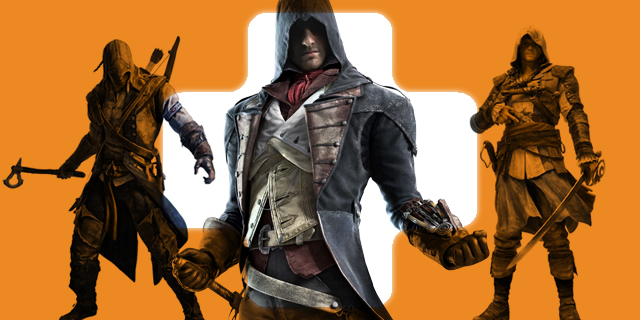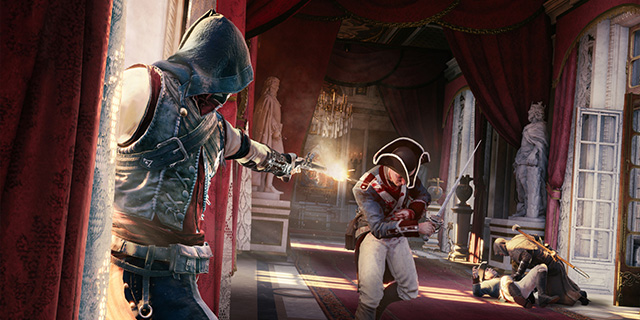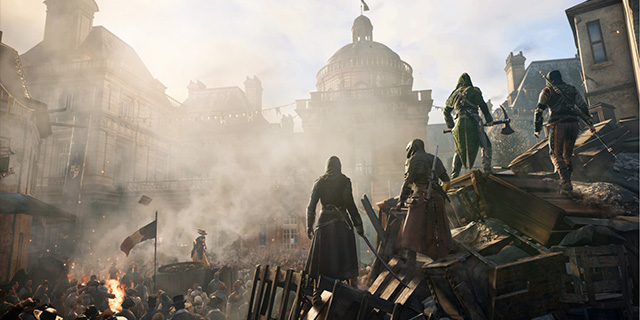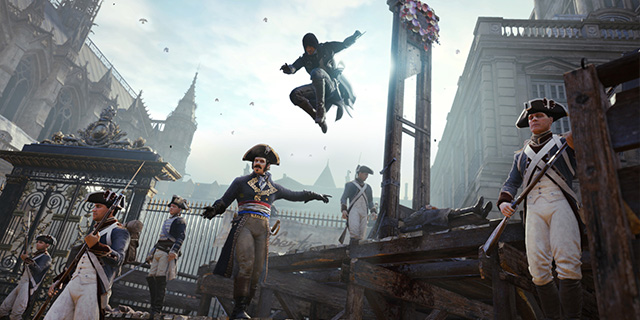
Assassin’s Creed is one of the most inconsistently amazing and frustrating franchises of the past five years. It utilizes immense creativity and takes us on journeys we rarely experience in other games, yet does so covered in the annoyances that seem to coat most triple-A games these days. Needless to say, it’s a mess of a franchise, but one with an unparalleled amount of potential.
Playing one of (yes, one of) this year’s new entries in the series, Assassin’s Creed: Unity, has demonstrated just how much of said potential has been lost. There is always a chance it will regain its footing, but even if it does reach the heights of Black Flag again, there is still the lingering feeling something is out of place. This is what I call the Assassin’s Creed problem. It’s not specific to this particular franchise, but it perfectly encapsulates everything that’s right and wrong with AC and why it leaves much to be desired.
Let’s start with the basic premise: The immense popularity of Assassin’s Creed is both a gift and a curse. It’s amazing to me that a franchise so focused on history (with some thinly-veiled science fiction roots, mind you) is as popular as it is. You won’t learn much about history playing these games, but being able to explore an open world during many varied points in history and in several different locations is fascinating. Even if you aren’t a history buff, it’s hard to deny just how cool the series is conceptually.

Its popularity has led to its annualization, however, which might be one of its biggest downfalls. Unity was not only a buggy mess of a game at launch, it was also poorly optimized for consoles. It’s gorgeous, but because of the focus on the improved tech, the game feels rushed. It doesn’t meet the standards you expect from the series, and these are some low standards to begin with.
Unity is still a dull game regardless of the technical problems, which makes me wonder what went wrong. Late 1700s-era Paris is a fantastic setting re-created in amazing detail, as you come to expect from the series, but the gameplay felt like a major step back from Black Flag. Returning to the series roots is a solid idea, but without any remarkable ideas to back it up you end up with a title that does little to differentiate itself from the rest of an increasingly stale series.
Black Flag’s mission design wasn’t particularly great either, but those missions coupled with the ship combat and exploration made for a refreshing take on an established formula. Assassin’s Creed III’s focus on moving away from its rooftop climbing roots also gave it a feeling of something different, even if the core gameplay was still the same. These small changes began to add up to something remarkable. Even if Unity focused more on the classic formula in terms of exploration, it could have evolved the game’s core design similarly to the last two games.

Therein lies the problem. Assassin’s Creed continues to be Ubisoft’s most popular (and profitable) franchise, thus allowing them to poor millions into making each game feel lovingly crafted. Yes, several teams contribute to the each iteration, but each game’s approach to history is unlike anything the industry has seen, and Ubisoft has the budget to help it stand out. Of course, that means we run into the problems Unity faced: it was rushed to meet the yearly schedule and suffered as a result.
This leads us to the game design issues. Despite the supposed focus on stealth, it’s only utilized in the most arbitrary and frustrating ways. Unity attempted to make assassination missions more open-ended, but it rarely felt like I was actually doing missions in any creative way. It was still leading me by the hand, pretending to offer me choices instead of actually giving me the options I wanted. In most scenarios, I found it best to just charge in, kill my target and escape with little to no repercussions for not taking my time. It’s not really designed to be stealth, it’s only a façade.
Each game offers dozens of hours worth of side quests and collectibles, but rarely gives you reason to go out of your way other than to fill a completion percentage. The actual act of exploring these cities is rewarding, with on-screen pop-ups telling you how awesome you are without any real reward. You don’t feel like you accomplish anything special, you simply unlock some new, unnecessary bonus that doesn’t really affect much at the end of the day. It traps modern game design sensibilities in a world that begs to be explored, but rarely gives you reason to do so.

This is what distinguishes a game like Black Flag from the rest. It may have been the same old Assassin’s Creed design, but having a ship to call your own, being able to sail around to world with limited restrictions and having a feeling of true freedom made it all worthwhile. Unity brings us back to the basics, which I welcome, but doesn’t really give us a reason why we’re there or show that the designers have learned anything from the past six games. Unity didn’t need pirate ships or a multitude of islands to discover, it just needed a compelling reason to be in that world. Instead, it made me feel like I was walking around a stuffy museum and given a cookie for every display I examined.
Don’t get me wrong, this was a problem in the older games as well. As much as I enjoyed Assassin’s Creed II, going back to it today might be difficult. It’s still a better game than something like Unity, sure, but it’s a sign that the series has done very little despite the unprecedented amount of freedom Ubisoft seems to have. It wowed us back then because there was nothing else like it.
Truthfully, there still isn’t, but even without a myriad of Assassin’s Creed clones on the market, the series’ core problems continue to get more noticeable with every release. Black Flag may be a mostly great game, one I consider my favorite in the series, but that’s only because it became easier to ignore the lingering issues. Unity, on the other hand, shoves them back in our face. The only difference is everything is shinier.

Assassin’s Creed is an incredible franchise trapped by its own popularity, lackluster game design and Ubisoft’s need to continue to pump them out without going back to the basics. I consider it one of the most important series around today, but without bucking the trend, we might someday have a future without it. That, to me, is the most depressing part of all.



















